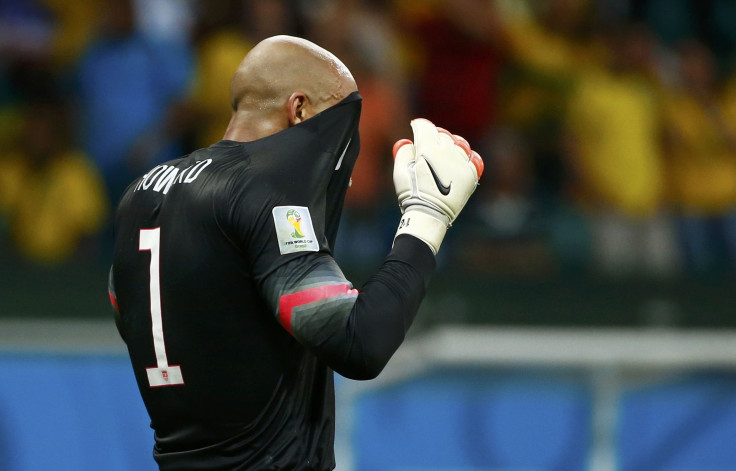VIDEO Belgium 2-1 USA: Highlights, Goals; US Suffer Extra-Time World Cup Heartache Once Again

The United States suffered extra-time heartache in the Round of 16 for the second straight World Cup as they crashed out 2-1 to Belgium in Salvador. Just as Asamoah Gyan scored the decisive goal for Ghana in the third minute of an added 30 in South Africa, Kevin de Bruyne did likewise to finally make Belgium dominance count and help send them through to a quarterfinal against Argentina, despite some even later drama.
After Romelu Lukaku looked to have put the seal on the win for Belgium, youngster Julian Green came on and provided an almost immediate goal to give the U.S. fresh hope heading into the final minutes. And they so nearly pulled off an extraordinary comeback but for Thibaut Courtois saving from point-blank range from Clint Dempsey to protect his side’s precarious advantage.
For much of the enthralling contest it had been Courtois’s opposite number grabbing the attention. Indeed, had it not been for a quite miraculous performance from U.S. goalkeeper Tim Howard to time and again rescue his team as they were left hanging on the ropes, Belgium’s superiority would surely have led to a win without the need for extra time.
None of that will disguise what will be another hugely painful loss for the U.S. as they again failed to make their mark on the World Cup’s latter stages. They will return home with much credit from a competition in which they exceeded expectations by emerging from the so-called “Group of Death.” But the continued failure to maintain possession and fulfill Klinsmann’s desire to be more proactive ultimately proved their undoing. All the traditional hallmarks of American teams -- incredible resolve, will power and belief -- were in full evidence throughout the tournament and this match, but were not enough.
Klinsmann had made a surprise selection in his starting lineup with the defensive midfield discipline of Kyle Beckerman being replaced by Geoff Cameron. Within the first minute there was a sign of the hole Beckerman left in the team. De Bruyne, excellent in qualifying this fine generation of Belgian talent for the World Cup but quiet thus far in Brazil, was the man who exploited those gaps between the lines throughout.
Inside 40 seconds De Bruyne played Divock Origi through on goal and it took the first of 16 saves from Howard, and the first of many with his legs, to keep the ball at bay. The hole in the midfield was seen again when Graham Zusi was robbed, Jan Vertonghen steamed through to set up De Bruyne and it was only a poor finish that allowed the ball to be deflected wide. Zusi’s disappointing outing continued with his lack of defensive cover contributing to Belgium having plenty of joy down their left side. The Sporting Kansas City midfielder was caught dozing to allow Vertonghen to run in behind him and it took a fine clearance from DaMarcus Beasley in the middle to stop Marouane Fellaini from tapping in.
Beasley was also a big part of providing the U.S. with ample encouragement in their limited forays going forward, despite their continued inability in this World Cup to keep possession. Michael Bradley again struggled trying to support Clint Dempsey, although was involved in the U.S.’ best chance of the opening half which Dempsey fired at Courtois.
Dempsey was again playing as the lone striker, with bold statements of Jozy Altidore’s fitness proved to be something of a smokescreen. Altidore had suffered a hamstring injury in what proved to be the Americans’ only win of this World Cup, against Ghana, as had Matt Besler. And a worrying spate of muscular injuries continued when Fabian Johnson was forced off on the half-hour mark to be replaced by youngster DeAndre Yedlin.
Yedlin provided some exciting bursts going forward, but spent much of the second half struggling to stem an increasing tide of Belgium pressure. It came particularly strong down Yedlin’s side, where Vertonghen twice forced Howard into saves as well as supplying a cross that was inches away from being converted.
Origi also headed onto Howard’s bar before Kevin Mirallas came on to add an extra attacking threat and the pair combined numerous times to force Howard into yet more last-gasps saves after the defense was breached. There was drama right at the end of regulation time, first when Howard had to scramble to deny a miscued shot from Belgium defender Vincent Kompany and then when U.S. substitute Chris Wondolowski appeared to have missed a golden chance for glory, although he had been wrongly flagged for offside.
It was the introduction of Lukaku’s pace and power amid the tiring legs and bodies at the start of extra time that ultimately proved decisive. The Chelsea striker, poor so far in this World Cup, shrugged off the challenge of the previously excellent Matt Besler, charged down the left and his cross deflected back to De Bruyne to finally beat Howard.
De Bruyne had been the best player on the pitch, the kind of technically gifted, intelligent player that the U.S. will ultimately need to produce if they are to make the breakthrough to become genuine World Cup challengers. And it was he who returned the favor for Lukaku to drill the ball past his teammate at Everton last season, Howard, right before the halfway point in extra time to apparently make the game safe.
Instead two minutes later, Green provided hope both for the U.S. to save this match and that he could be the star the team needs going forward. Just seconds into his first appearance of this World Cup, the 19-year-old ran in behind the Belgium defense to meet a wonderful through ball form Bradley and volley home. But when Courtois denied Dempsey after a clever free-kick routine, the U.S. challenge had finally run its course.
© Copyright IBTimes 2024. All rights reserved.











